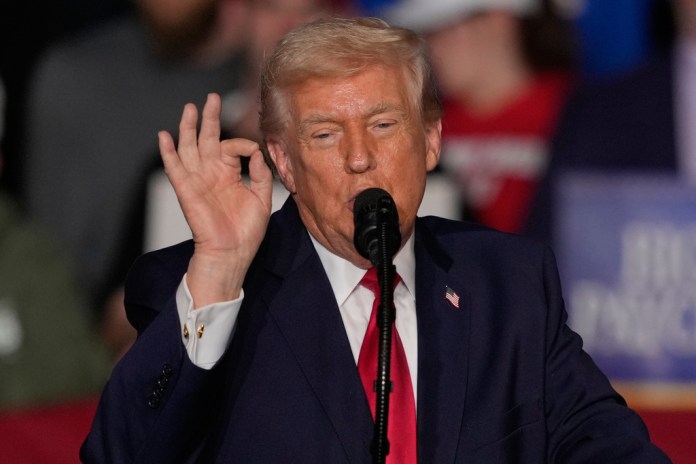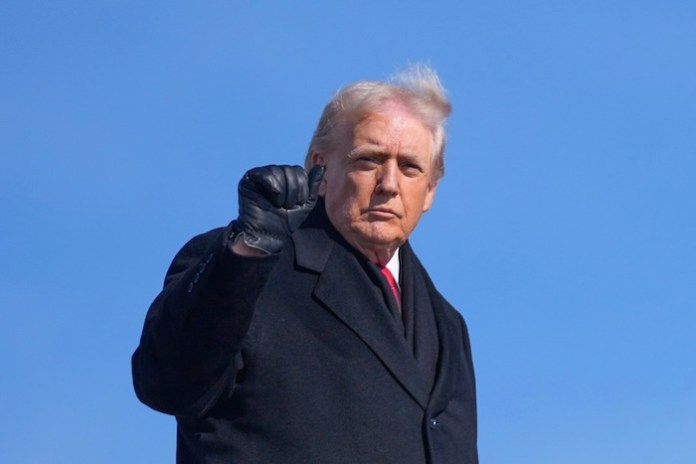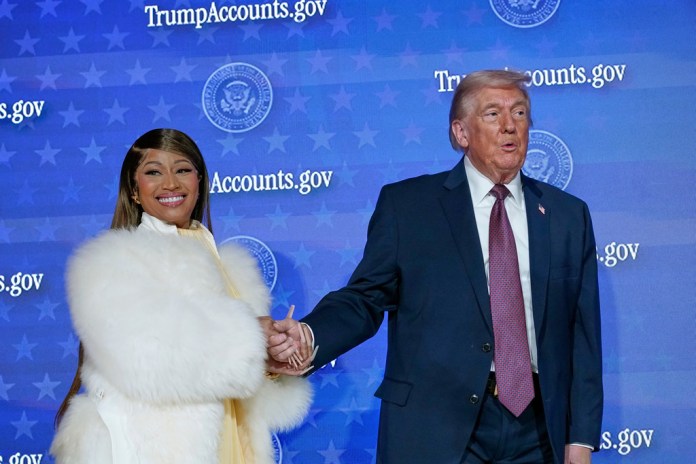Trump Takes Victory Lap After Inflation Report Vindicates Him on Tariffs — Hammers Top Economist
The article covers President Donald Trump’s criticism of Goldman Sachs’ CEO David Solomon and the firm’s economists following July’s inflation data, wich showed inflation rising less than Wall Street had predicted. Trump highlighted that tariff revenues were strong and argued that tariffs had not caused inflation or economic problems but instead brought significant revenue to the U.S. Treasury. He accused Goldman Sachs of making incorrect forecasts about tariffs causing inflation, stock market declines, and recession, and suggested Solomon focus on being a DJ rather than leading the financial institution. The article also notes that despite Goldman Sachs’ earlier predictions of a tariff-induced recession and lower stock market targets, the market has rallied, reaching record highs. Trump’s administration has negotiated trade agreements with several countries while maintaining tariff policies. Economists affiliated with Goldman Sachs have analyzed tariff impacts, estimating that companies bear the majority of tariff costs, with consumers paying a smaller share so far, although this share may increase over time. Trump’s economic advisor emphasized that the reported inflation rate is low and attributed this to the administration’s policies on deregulation, energy, and taxation, contending that tariffs are not a significant driver of inflation.
President Donald Trump took a shot at Goldman Sachs’ CEO and its economists Tuesday while touting July’s inflation number, which came in cooler than expected.
Goldman Sachs was among the many investment firms that predicted in April that Trump’s tariff policy would be inflationary, tank the stock market, and likely cause a recession.
The Bureau of Labor Statistics reported that the consumer price index rose 2.7 percent in July compared to the same month last year and rose 0.2 percent from June.
That compares to a 2.8 percent increase predicted by Wall Street, according to CNBC.
Trump responded to the report, posting on , “Trillions of Dollars are being taken in on Tariffs, which has been incredible for our Country, its Stock Market, its General Wealth, and just about everything else.”
The Trump Administration brought in $29.6 billion of tariff revenue for July.
I would stay tariffs are working. pic.twitter.com/viy6gLsmDq— Kate (@kate_p45) August 3, 2025
“It has been proven that even at this late stage, Tariffs have not caused Inflation, or any other problems for America, other than massive amounts of CASH pouring into our Treasury’s coffers. Also, it has been shown that, for the most part, Consumers aren’t even paying these Tariffs, it is mostly Companies and Governments, many of them Foreign, picking up the tabs,” the president continued.
“But David Solomon and Goldman Sachs refuse to give credit where credit is due. They made a bad prediction a long time ago on both the Market repercussion and the Tariffs themselves, and they were wrong, just like they are wrong about so much else.”
Trump concluded, “I think that David should go out and get himself a new Economist or, maybe, he ought to just focus on being a DJ, and not bother running a major Financial Institution.”
Donald J. Trump 08.12.25 10:24 AM EST pic.twitter.com/y6QTMieq8Q
— Fan Donald J. Trump Posts From (@TrumpDailyPosts) August 12, 2025
Yahoo Finance reported that on April 9, following Trump’s “Liberation Day” reciprocal tariff announcement, Goldman Sachs’ research economic team forecast that the policy would push the U.S. into recession in 2025.
“During that same time period in the spring, Goldman’s equity strategy team was among the more than 10 Wall Street firms tracked by Yahoo Finance that cut its year-end target for the S&P 500 as the stock market tanked in reaction to tariffs,” the outlet noted.
“The equity strategy team led by David Kostin moved its year-end target for the S&P 500 to as low as 5,700, which would’ve reflected a negative year for the benchmark index. But as the market has rallied, Kostin, along with many others on Wall Street, has become more positive on equities. Kostin now sees the S&P 500 ending the year at 6,600, or roughly 3% higher than where the index was trading on Tuesday,” Yahoo said.
As of Tuesday afternoon, the S&P 500 Index stood at a record high of approximately 6,400, according to CNBC.
In April, Trump placed a 90-day pause on his reciprocal tariff policy, which his administration used to negotiate trade agreements between various countries, with the understanding that if an agreement could not be reached, the announced Liberation Day tariff rate would be the benchmark.
Trump’s team has successfully negotiated agreements with the European Union, Japan, the United Kingdom, Indonesia, South Korea, Vietnam, and the Philippines, CBS News reported.
Fox Business reported Tuesday that Goldman Sachs economists, led by Jan Hatzius, released an analysis over the weekend showing foreign exporters have absorbed 14 percent of Trump’s tariff costs through June, while consumers have paid 22 percent, and businesses absorbed 64 percent of the cost.
The economists predicted that the American consumers will pay will eventually be 67 percent.
Stephen Miran, head of Trump’s Council of Economic Advisers, told Fox News that the consumer price index is running at a 1.9 percent annualized rate.
LMAO. Here is the inflation chart updated for Jul 2025 CPI, the blue line. pic.twitter.com/l1T3nJSLJq
— David O’Donnell (@brecko) August 12, 2025
“That’s an example of the effects of the president’s profoundly disinflationary policies of deregulation, border control, energy abundance, and tax incentives to boost capital stock,” Miran said. “That’s all very powerful in bringing down inflation, and you’re seeing it start to work.”
🚨 CNN: “Energy FELL… that was largely driven because of gas prices falling in the month of July.”
“Look at that food! This is where people spend their money… flat — 0% — and actually DOWN at the grocery store.” pic.twitter.com/2f6NDXjHBc
— Rapid Response 47 (@RapidResponse47) August 12, 2025
The economist further argued that the goods prices that did go up in July were part of a global trend seen at a similar scale inside the United Kingdom, Canada, and Mexico, meaning they had nothing to do with Trump’s tariff policies.
Miran concluded, “So there is just very little ground to stand on to think that tariffs are any meaningful driver of inflation.”
Advertise with The Western Journal and reach millions of highly engaged readers, while supporting our work. Advertise Today.
" Conservative News Daily does not always share or support the views and opinions expressed here; they are just those of the writer."




